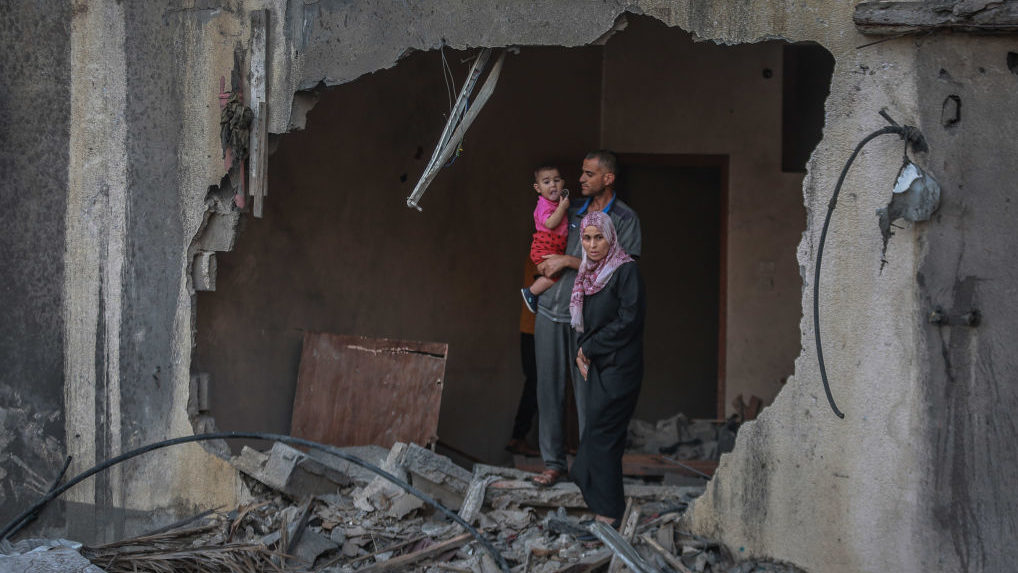Hamas Stayed on the Sidelines During Latest Violence With Israel. It Could Cost It on the Palestinian Street.
The movement ‘acted like the only adult in the room,’ expert says
Many observers of the Palestinian scene were surprised last weekend by Hamas’ decision not to participate in the firing of rockets against Israel in reaction to Israel’s operation in Gaza.
Hamas might have raised its profile as a sane, but solid interlocutor on both political and security issues, but that did little to quell the anger and frustration of its supporters.
Jamal Dajani, who served as communications director for former Palestinian Authority Prime Minister Rami Hamdallah, told The Media Line that Hamas understood that the new Israeli leadership “initiated this aggression” against Gaza for political gain.
“Hamas did not take the bait and showed self-restraint, avoiding a prolonged war that would have caused more death and destruction,” he said.
“It never bodes well when the international community stands by and does nothing and lets Israel slaughter Palestinians at whim,” Dajani added.
Hamas did not take the bait and showed self-restraint, avoiding a prolonged war that would have caused more death and destruction
Khalil Jahshan, executive director of the Arab Center Washington DC, told The Media Line that, unlike previous military confrontations between Israel and Palestinian groups in Gaza, the weekend’s clashes were sudden and developed rather quickly, making it difficult for diplomatic efforts to prevent the fighting from taking place. The US and its Arab allies mediating between the parties put extraordinary pressure on Hamas not to participate in the fighting, to prevent escalation and improve their chances at ending the conflict.
“In circumstances like this, victory tends to be symbolic and in the eye of the beholder. The limited nature and duration of the clashes allowed both sides, Israel and Palestinian Islamic Jihad, to claim victory before their respective constituencies, while Hamas acted like the only adult in the room,” Jahshan said.
Ofer Zalzberg, Middle East Program director at the Vienna-based Herbert Kelman Institute for Interactive Conflict Transformation, told The Media Line that Hamas’ decision to stay out of the fighting provided a tailwind to the dominant recommendation of Israel’s defense officialdom: strengthen the Gazan economy despite Hamas’ rule in order to defer the outbreak of wars.
“Israeli advocates of this approach tend to think Israel’s more permissive policies over the last year have proved themselves these days, providing Hamas with greater maneuvering room to take such decisions and refrain from escalating,” he said.
Zaha Hassan, a human rights lawyer and a fellow with the Middle East Program at the Carnegie Endowment for International Peace, told The Media Line that Hamas is always interested in showing itself to be the “real” resistance to Israeli occupation while the Fatah-led Palestinian Authority government is standing by during escalations of violence, as it did during the 11-day war in May 2021.
“This latest bombardment by Israel in Gaza did not present such an opportunity to Hamas. And so, it remained on the sidelines, not wanting to cause the economic fallout that would invariably result, e.g., [suspension of] work permits and alleviation of movement and access restrictions,” she said.
“But if Hamas’ popularity has been based on it being the ‘real’ resistance, particularly when al-Aqsa is involved, keeping quiet during the march of hundreds of Israeli right-wing activists on the Haram al-Sharif for the Temple Mount destruction commemoration was not a good look for the organization,” she continued, referring to Sunday’s Tisha B’Av fast day.
“In this sense, Hamas will have lost some face with Palestinians,” Hassan said.
Samar Muhareb, executive director of the Amman-based Arab Renaissance for Democracy and Development, told The Media Line that the current cycle of violence in Gaza has been frustrating.
“But despite all the disappointments and losses, the resistance in Gaza came out with tangible accomplishments on the ground that will lead to change if Israel continues in its madness within the current fragile cease-fire,” Muhareb said.
Hamas has been occasionally dragged into battle by Palestine Islamic Jihad. This time the Israelis started it, but Hamas was not willing to risk increasing the discontent.
Nadim Shehadi, an associate fellow at Chatham House, notes that there has been mounting discontent with the rule of the militias in Gaza.
“Hamas has been occasionally dragged into battle by Palestine Islamic Jihad. This time the Israelis started it, but Hamas was not willing to risk increasing the discontent,” he told The Media Line.
Palestinian cartoonist Khalil Abu Arafeh argues that the term “resistance” is misused by factions, some of them connected to Iran’s Islamic Revolutionary Guard Corps.
“When an armed faction [Islamic Jihad] is unable to forge a coalition on the ground with a fellow ideological faction and when its own rockets fall in a Gaza refugee camp causing deaths and injuries to fellow Palestinians, that shows that the question that needs to be asked is whether what [Islamic] Jihad has done is resistance and what Hamas has not done is submissiveness. I think terms need to be reevaluated,” Abu Arafeh said.
Speaking on Al Jazeera International, Ali Abunimah, co-founder of the online publication The Electronic Intifada, argued that popular demand would have forced Hamas to join the fighting had Israel not agreed to a cease-fire.


